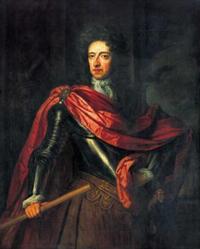William III (William of Orange, Dutch: Willem Hendrik Prins van Oranje)
Stadholder of the United Provinces of the Netherlands and king of Great Britain, b. 14 November (4 November*) 1650 (The Hague, Netherlands), d. 19 March (9 March) 1702 (London, England).
 William was the son of William II, stadholder (regent) of five of the United Provinces of the Netherlands, and Mary, the daughter of Charles I of England. The house of Orange was popular with the people, but his father had made enemies with the oligarchy, and when he died - eight days before his son was born - his enemies moved to exclude Orange from power.
William was the son of William II, stadholder (regent) of five of the United Provinces of the Netherlands, and Mary, the daughter of Charles I of England. The house of Orange was popular with the people, but his father had made enemies with the oligarchy, and when he died - eight days before his son was born - his enemies moved to exclude Orange from power.
The "Act of Seclusion" of 1654 banned Prince William and his descendants from holding office, and the "Perpetual Edict" of 1667 decreed that the offices of stadholder and captain general be no longer held by the same person. (The two offices were traditionally held by the princes of Orange.)
But the prince continued to receive an education that prepared him for high office, and when king Louis XIV of France and king Charles II of England threatened war against the United Provinces, William was appointed captain general in 1672 by public demand.
The war broke out one month later, and while the navy could hold out against England, the ill prepared troops could not stop the French advance. The public now angrily demanded William's appointment as stadholder, and his elevation to the position was proclaimed before the year was over.
William concentrated on rebuilding the army and find allies. He found support from the Holy Roman emperor Leopold I, from Brandenburg and from Spain. By 1674 he had managed to turn the situation around; in 1678 and 1679 he forced peace treaties on England and France.
One of the underlying causes of the war had been the confrontation between feudalism, defended by Louis XIV and Charles II, and the new political forces of trade and industry promoted by the Dutch provinces. In France feudalism was unbroken, but England had undergone a revolution and become a protestant republic in 1642 - 1649, and James II, the successor to Charles II, was subsidized by Louis XIV to strengthen the position of the feudal aristocracy again.
In 1687 members of the English parliament sent a letter to William and asked him to depose James II and assume the position of king of England. William and his troops crossed the North Sea in 1688; James II fled to France, and William was declared king of England and Scotland in 1689. (These developments are often referred to as the "Glorious Revolution.")
The reign of William III marked the beginning of the British system of constitutional monarchy, in which the power is in the hands of a parliament. William's parliament was tired of war, reduced the size of the army and turned its back on developments on the continent. William sensed that French feudalism would not tolerate peace with the new Britain and tried to stabilize the situation through various treaties.
In 1700 the Spanish king died, and Louis XIV, breaking a treaty concluded a year earlier, declared his grandson the new king of Spain. In 1701 James II died in exile, and Louis XIV proclamed his son king of England. This raised the people's preparedness for war. William III did not witness it; he died before it began.
William of Orange played an important role in Europe's transition from feudalism to capitalism. His full acceptance of the parliamentary system in the Bill of Rights was far-sighted and appropriate.
In his actions William was not a revolutionary or a radical, and in some of his actions he showed rather weak judgement. When some Scottish clansmen were slow to swear allegiance to him and were murdered in cold blood in the Glen Coe massacre of 1692, he took no action. When the Scottish parliament forced a public investigation in 1695 he only dismissed his secretary, who had been found responsible for the massacre. He had shown a similar failure to act in 1672 already in the Netherlands, when he did not punish the murders of two men suspected by a mob to have committed treason.
Despite these weaknesses William was a true supporter of the new order. He supported the Toleration Act of 1689, which guaranteed freedom of religion. The independence of the judiciary, formally guaranteed in the Act of Settlement of 1700 - 1701, was his own initiative.
* English date of the time. The calendar used in continental Europe did not come into force in England until 1752.
home
 William was the son of William II, stadholder (regent) of five of the United Provinces of the Netherlands, and Mary, the daughter of Charles I of England. The house of Orange was popular with the people, but his father had made enemies with the oligarchy, and when he died - eight days before his son was born - his enemies moved to exclude Orange from power.
William was the son of William II, stadholder (regent) of five of the United Provinces of the Netherlands, and Mary, the daughter of Charles I of England. The house of Orange was popular with the people, but his father had made enemies with the oligarchy, and when he died - eight days before his son was born - his enemies moved to exclude Orange from power.